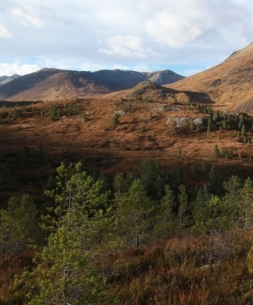With thanks to Richard Bunting.
Conservation charity Trees for Life has welcomed the first United Nations International Day of Forests with a call for more people to get involved in helping to create a renaissance for Scotland’s beleaguered forests.
The UN General Assembly has proclaimed 21 March to be the International Day of Forests – a day to celebrate and raise awareness of the importance of forests and trees for all life on earth.
Across Scotland, forest restoration efforts are bringing new or renewed life to many ancient native woodlands, from Rassal Ashwood in Wester Ross to the Carrifran Wildwood in Dumfries and Galloway, and from the Loch Sunart Oakwoods in Lochaber to Abernethy and Glenfeshie in the Cairngorms National Park.
Yet with increasing concerns about climate change, deforestation and biodiversity loss – as well as tree diseases such as ash dieback and Dothistroma Needle Blight, which is a potential threat to the iconic Scots pine – the need for concerted action to conserve and regenerate Scotland’s native woodlands is more important than ever before.
Alan Watson Featherstone, Trees for Life’s Executive Director, said:
“There are signs of hope for woodlands throughout Scotland, but we urgently need more people to help make a difference now – the future of Scotland’s forests is literally in our hands. We are the last generation with the opportunity to save the CaledonianForest, for example, as many of the remnants of this Scottish equivalent of the rainforests are in terminal decline.
“Fortunately projects such as ours provide an inspiring and practical way for people from all walks of life to help make a personal and positive difference – to help restore natural wonders such as the CaledonianForest and to reverse the global trend of deforestation.”
For 2013, the Year of Natural Scotland, Trees for Life is:
- Working to double its rate of restoration work in the Caledonian Forest.
- Running a Million More Trees campaign – an ambitious bid to establish a further million trees by planting and natural regeneration by 2017.
- Expanding its acclaimed Conservation Weeks, offering more opportunities for people to make a personal contribution to the environment and to gain hands-on conservation experience. The weeks are being held in eight locations across the Highlands, in a longer season than ever before that has begun this week and runs until November.
- Launching Wildlife Weeks for conservation volunteers who want to spend extra time learning about and observing the CaledonianForest’s remarkable wildlife.
- Running fortnightly Conservation Days, for local people to take practical action.
- Enabling disadvantaged volunteers from diverse backgrounds, including older people and those who are unemployed or on low incomes, to help directly in forest restoration work – an initiative made possible by a £45,900 grant from the Heritage Lottery Fund.
Following a long history of deforestation, some 150 years ago the Caledonian Forest reached a critical point of no return. Since then, with too few remaining trees and too many deer eating all the seedlings that germinate, young trees have struggled to get established. This has left ‘geriatric’ forests made up of old trees at the end of their lives, with no new ones growing to replace them.
Today, only a fraction of the former Caledonian Forest survives, with its native pinewoods reduced to 35 isolated remnants. However, Trees for Life is restoring the forest to a wilderness region of 1,000 square miles in the Highlands to the west of Loch Ness and Inverness.
Volunteers from the award-winning charity have helped to plant more than one million trees at dozens of locations, and to create 10,000 acres of new forest. Amongst these emerging forests, a complex web of life is renewing itself. Habitat restoration is making a big difference to the wildlife of the Caledonian Forest, which includes the strawberry spider, wood ants, red squirrels, rare sawflies, ospreys and capercaillies.
For more details, see www.treesforlife.org.uk or call 0845 458 3505.
- Comments enabled – see comments box below. Note, all comments will be moderated.

Good piece.
As a member of The Woodland Trust I thoroughly approve of all the work being carried out by “Trees for Life” organisation
The Caledonian Forrest was largely destroyed by human deforestation. I love forrests but I also love deer, and I believe Trees for Life and The Woodland Trust advocate the (unnecessary) killing of deer.